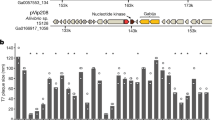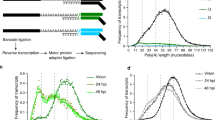Abstract
A SERIES of 2–5 linked oligoadenylic acid triphosphate (2–5A) inhibitors of cell-free protein synthesis are formed from ATP by an enzyme (2–5A synthetase) activated in interferon-treated cell extracts or rabbit reticulocyte lysates by double-stranded RNA1–4. The major active species is the trimer, pppA2′p5′A2′p5′A. Cell-free protein synthesis is inhibited by subnanomolar concentrations of 2–5A and this inhibition seems to be mediated at least in part, by a nuclease which degrades mRNA5. However, 2–5A, the nuclease and the inhibition of protein synthesis are all unstable in cell-free systems. 2–5A is rapidly degraded in such systems prepared from control (or interferon-treated) cells, nuclease activity is transient and in the absence of a 2–5A regenerating system protein synthesis resumes if fresh mRNA is added6,7. Extracts derived from cells that have never been treated with interferon, therefore, have mechanisms for the synthesis of 2–5A (rabbit reticulocytes) and for responding to and degrading 2–5A. Thus, the 2–5A system, in addition to any role it has in the antiviral action of interferon, may also be involved in the regulation of normal cell growth and development. The extraordinary potency of 2–5A and its instability in cell-free systems makes the task of detecting 2–5A in intact cells very difficult. As an alternative we have studied the effect of exogenous 2–5A on protein synthesis in intact cells, using a recently described method for making animal cells reversibly permeable to small molecules8. Here we report that pppA2′p5′A2′p5′A and related 2′–5′ linked oligonucleotides inhibit protein synthesis in hypertonically treated BHK–21 cells.
This is a preview of subscription content, access via your institution
Access options
Subscribe to this journal
Receive 51 print issues and online access
$199.00 per year
only $3.90 per issue
Buy this article
- Purchase on Springer Link
- Instant access to full article PDF
Prices may be subject to local taxes which are calculated during checkout
Similar content being viewed by others
References
Hovanessian, A. G., Brown, R. E. & Kerr, I. M. Nature, 268, 537–540 (1977).
Kerr, I. M., Brown, R. E. & Hovanessian, A. G. Nature, 268, 540–542 (1977).
Hovanessian, A. G. & Kerr, I. M. Eur. J. Biochem. 84, 149–159 (1978).
Kerr, I. M. & Brown, R. E. Proc. natn. Acad. Sci. U.S.A. 75, 256–260 (1978).
Clemens, M. J. & Williams, B. R. G. Cell 13, 565–572 (1978).
Kerr, I. M. et al. Modern Trends in Human Leukaemia III (Springer, Heidelberg, in the press).
Williams, B. R. G., Kerr, I. M., Gilbert, C. S., White, C. N. & Ball, L. A. Eur. J. Biochem (in the press).
Castellot, J. J., Miller, M. R. & Pardee, A. B. Proc. natn. Acad. Sci. U.S.A. 75, 351–355 (1978).
Carrasco, L. Nature 272, 694–699 (1978).
Fricke, U. Analyt. Biochem. 63, 555–558 (1975).
Author information
Authors and Affiliations
Rights and permissions
About this article
Cite this article
WILLIAMS, B., KERR, I. Inhibition of protein synthesis by 2′–5′ linked adenine oligonucleotides in intact cells. Nature 276, 88–90 (1978). https://doi.org/10.1038/276088a0
Received:
Accepted:
Issue Date:
DOI: https://doi.org/10.1038/276088a0
This article is cited by
-
Diverse immune mechanisms may contribute to the survival benefit seen in cancer patients receiving hyperthermia
Immunologic Research (2010)
-
Identification of human thioredoxin as a novel IFN-gamma-induced factor: Mechanism of induction and its role in cytokine production
BMC Immunology (2008)
-
Effect of dephosphorylated 2′,5′-trioligoadenylate on the entry of sodium ions into human neuroblastoma cells
Neurophysiology (2008)
-
Inverse relationship between poly (ADP-ribose) polymerase activity and 2?,5?-oligoadenylates core level in estrogen-treated immature rat
Molecular and Cellular Biochemistry (1990)
-
Treatment with human recombinant leukocyte interferons inhibitsin vitro invasive ability of human lung carcinoma cells
Clinical & Experimental Metastasis (1986)
Comments
By submitting a comment you agree to abide by our Terms and Community Guidelines. If you find something abusive or that does not comply with our terms or guidelines please flag it as inappropriate.



